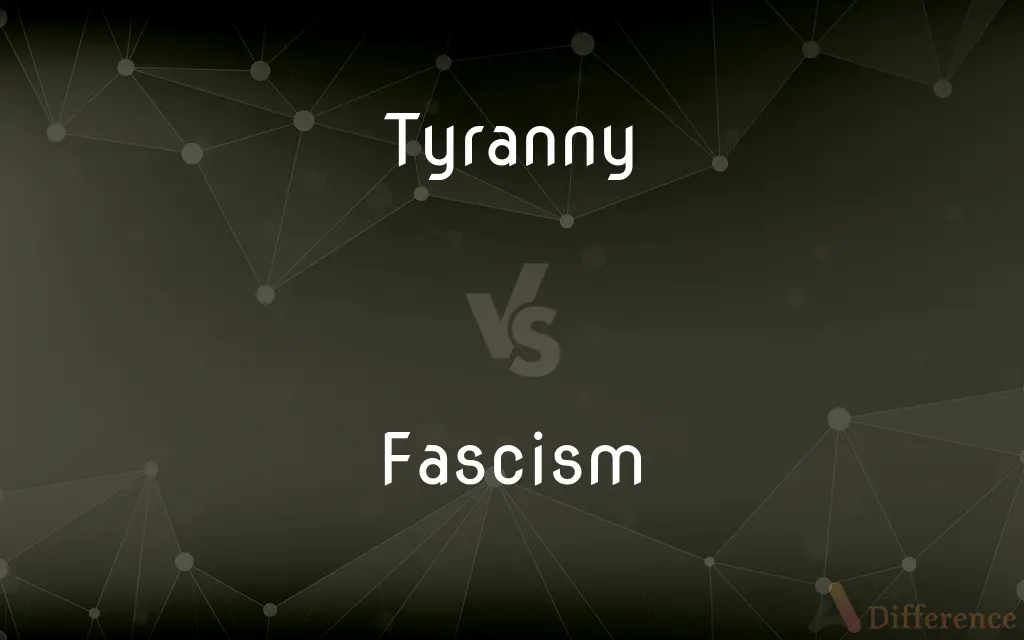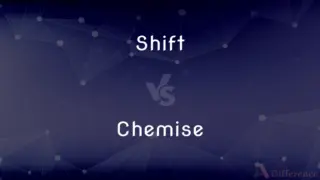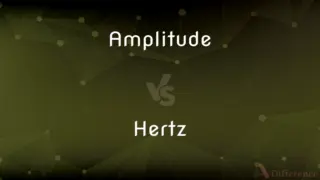Tyranny vs. Fascism — What's the Difference?

Difference Between Tyranny and Fascism
ADVERTISEMENT
Compare with Definitions
Tyranny
Cruel and oppressive government or rule
Refugees fleeing tyranny and oppression
Fascism
Fascism () is a form of far-right, authoritarian ultranationalism characterized by dictatorial power, forcible suppression of opposition, and strong regimentation of society and of the economy, which came to prominence in early 20th-century Europe. The first fascist movements emerged in Italy during World War I, before spreading to other European countries.
Tyranny
Unjust or oppressive governmental power
"He tended to see the Crown as the benign center of the empire and Parliament as the malevolent source of tyranny" (Gordon S. Wood).
Fascism
An authoritarian and nationalistic right-wing system of government and social organization.
Tyranny
A government in which a single ruler is vested with absolute power
People liberated from a brutal tyranny.
ADVERTISEMENT
Fascism
A system of government marked by centralization of authority under a dictator, a capitalist economy subject to stringent governmental controls, violent suppression of the opposition, and typically a policy of belligerent nationalism and racism.
Tyranny
The office, authority, or jurisdiction of an absolute ruler
Pisistratus held the tyranny of Athens.
Fascism
A political philosophy or movement based on or advocating such a system of government.
Tyranny
The oppressive or unjust use of power
Parental tyranny.
Fascism
Oppressive, dictatorial control.
Tyranny
A tyrannical act
Refused to submit to her husband's tyrannies.
Fascism
Any right-wing, authoritarian, nationalist ideology characterized by centralized, totalitarian governance, strong regimentation of the economy and society, and repression of criticism or opposition.
Tyranny
An oppressive or harshly limiting condition
The tyranny of social expectations.
Fascism
Any system of strong autocracy or oligarchy usually to the extent of bending and breaking the law, race-baiting, and/or violence against largely unarmed populations.
Tyranny
A government in which a single ruler (a tyrant) has absolute power; this system of government.
Fascism
Any extreme reliance on or enforcement of rules and regulations.
Tyranny
The office or jurisdiction of an absolute ruler.
Fascism
A political theory advocating an authoritarian hierarchical government; - opposed to democracy and liberalism.
Tyranny
Absolute power, or its use.
Fascism
An authoritarian system of government under absolute control of a single dictator, allowing no political opposition, forcibly suppressing dissent, and rigidly controlling most industrial and economic activities. Such regimes usually try to achieve popularity by a strongly nationalistic appeal, often mixed with racism.
Tyranny
A system of government in which power is exercised on behalf of the ruler or ruling class, without regard to the wishes of the governed.
Fascism
Specifically, the Fascist movement led by Benito Mussolini in Italy from 1922 to 1943.
Tyranny
Extreme severity or rigour.
Fascism
Broadly, a tendency toward or support of a strongly authoritarian or dictatorial control of government or other organizations; - often used pejoratively in this sense.
Tyranny
The government or authority of a tyrant; a country governed by an absolute ruler; hence, arbitrary or despotic exercise of power; exercise of power over subjects and others with a rigor not authorized by law or justice, or not requisite for the purposes of government.
"Sir," would he [Seneca] say, "an emperor mote needBe virtuous and hate tyranny."
Fascism
A political theory advocating an authoritarian hierarchical government (as opposed to democracy or liberalism)
Tyranny
Cruel government or discipline; as, the tyranny of a schoolmaster.
Tyranny
Severity; rigor; inclemency.
The tyranny of the open night's too roughFor nature to endure.
Tyranny
A form of government in which the ruler is an absolute dictator (not restricted by a constitution or laws or opposition etc.)
Tyranny
Dominance through threat of punishment and violence
Share Your Discovery

Previous Comparison
Shift vs. Chemise
Next Comparison
Amplitude vs. Hertz













































